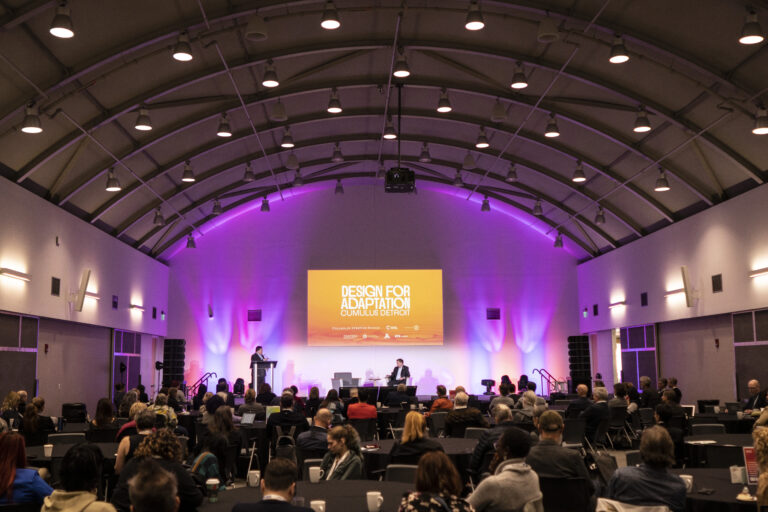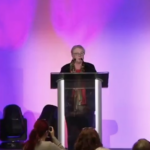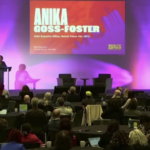
- Kim Kisner
- Events
- 11/08/2022
College for Creative Studies Hosted Designers, Educators, and Researchers from Around the World Toward Creating a Sustainable and Humane Future

Cumulus, a global association of art and design education and research, held its annual conference, Design for Adaptation in Detroit Nov. 1-4 at the College for Creative Studies. This marks only the second time in its 30-year history that the conference was in North America.
Cumulus connects 350 member institutions across 63 countries to exchange knowledge and best practices to elevate the positive role of designers and artists in creating sustainable and humane futures for all.

“If there is one thing we know, we are stronger together,” said Terry Barclay, SBN Detroit Chair and CEO of Inforum, in a Thursday afternoon welcome address. “I think we have a common sense of urgency to break down silos that slow collaboration and this conference is certainly about that.” SBN Detroit was a conference sponsor.
“This international conference has such diverse participation,” said Neil Hawkins, president of the Fred A. and Barbara M. Erb Family Foundation, who moderated a keynote address. We have creative designers hoping to change the trajectory of climate disasters. We have local Detroit leaders demanding justice for people already suffering impacts. We have great minds from all corners of the earth here in Detroit, which in many ways can be called ground zero for the climate crisis.”
To that end, he noted that metro Detroit has endured serious local flooding from three 500-year rainfalls in the last ten years, holds 25% of the world’s surface freshwater in the great lakes, and the state is fittingly named after a natural resource – Michigan meaning “big lake.”
Ian Lambert, co-chair and submissions chair for Cumulus 2022 and also dean of graduate studies at the College for Creative Studies, said,
“As the only UNESCO-designated city of design in the U.S., Detroit has an incredible history of makers and manufacturing and design, so it’s fitting that Cumulus was held here. And it’s huge for Detroit.”
The conference – focusing largely on the issue of climate change, automation, and income inequality – explored the role designers play in fostering adaptation through a wide range of approaches, methods, visions, and experiments. In that vein, the mission is to think ahead to catalyze ideas to reduce vulnerabilities and foster resilience for communities.
Noting that the world is 1.2 degrees Celsius warmer than at any point in human civilization and that 300 billion tons of carbon have been added to the atmosphere by humans, keynote speaker Mikko Ollikainen, head of the Adaptation Fund, said to the audience of designers, “You are the minds to shape the future and you have your work cut out for you. … “We are facing an increasing arrival of uncertainty and must be prepared for things we do not expect and prepared to withstand shocks.”

Land use and its relationship to climate change and inequity were the focus of several panels. Anika Goss, CEO of Detroit Future City, said in her keynote, “When we look at the cities in Detroit and around the world that are hit hardest by climate change, it’s always the poorest and the brownest neighborhoods.”
She pointed to a community on the lower east side that suffered stormwater flooding as an example, saying, “From an economic standpoint these families continue to lose value in their homes and property simply because they live in a neighborhood with poor infrastructure.”
The Eastside Community Network is working to put residents in charge of enhancing their neighborhoods toward resiliency. President Donna Given referenced its LEAP Sustainability Fellowship saying, “When you give someone a small amount of money and the responsibility to build a better space it’s amazing what that can do to a neighborhood.” The fellowship is a training and development program where fellows develop community projects, apply for grant funds to support them, and then implement them with the help of the community.
To that end, Jerry Hebron, executive director of Oakland Avenue Urban Farm, shared her story of growing up near Motown in its heyday, leaving the city, and then returning in 2005 to find it riddled by crime and decayed. She became an activist and was charged to find out what needs the community had. “I knocked on doors to collect information and found that housing and food were the residents’ most important needs.”
The high vacancy rate and open land equaled opportunity. The community wanted a garden and they built one – 20×20 feet. Today, 14 years later, they are farming 3.5 acres, a farmers market, youth programming, and more. “The community reclaimed that land and worked together to change their neighborhood.”
Linking this back to design, Lambert and Leslie Tom, chief sustainability officer at the Charles H. Wright Museum of African American History, presented a collaboration involving the repurposing of three dying trees on the museum’s property.
Instead of letting the trees end up in a landfill, The Wright and the Center for Creative Studies repurposed the trees and created a curriculum around co-design for sustainability, climate justice, and African American material culture, out of which came a narrative around how two neighbors – a museum and an art school – set a precedent for climate justice art.
“One of the pieces a student created spoke to land use in Detroit by combining window panels from an abandoned home and the repurposed timber to tell the story of decay and rebuild,” Lambert said.
There is no doubt that the complex consequences of climate change have pushed the need for community resilient strategies to emerge and thrive in the face of change. About the role designers play in this, Ollikainen said, “How designers see the world and work has a profound impact on building sustainable solutions. You have the vision, and you have the skills to turn that vision into reality.”
Be sure to subscribe to our newsletter for regular updates on sustainable business practices in and around Detroit.
Kim Kisner
- All
- Business
- Community
- Education
- Events

Unique Monique Scented Candles, a Detroit-based business founded by Monique Bounds., aims to produce candles and household products with clean ingredients and local supply chains. What began as a personal hobby during college has evolved into a full-time venture producing coconut oil and soy-based candles made with essential oils and locally sourced materials. SBN Detroit interviewed Bounds about launching a sustainable product line, sourcing challenges in Michigan, and...

Eastern Market Partnership, in collaboration with the City of Detroit’s Office of Sustainability Urban Agriculture Division, has announced $240,000 in grant funding to support Detroit-based farmers and farmer collectives. The grants will advance food access, climate education, sustainable land use, and economic opportunity, with priority given to Black- and Indigenous-led farms, youth-led initiatives, and projects rooted in historically disinvested neighborhoods. The recipients – ranging from cooperatives and community...

Citizen Robotics is a Detroit-based nonprofit that advances the use of robotics and digital manufacturing in residential construction, focusing on improving productivity, sustainability, and long-term affordability. Best known for its early work in 3D-printed housing, it explores how alternative construction methods and new financial models can reduce material waste, lower lifetime operating costs, and enhance the resilience of homes. SBN Detroit interviewed Tom Woodman, founder and president of...







